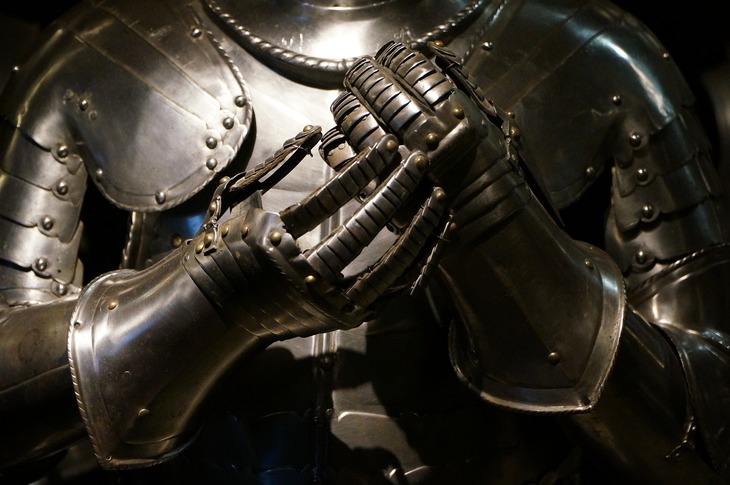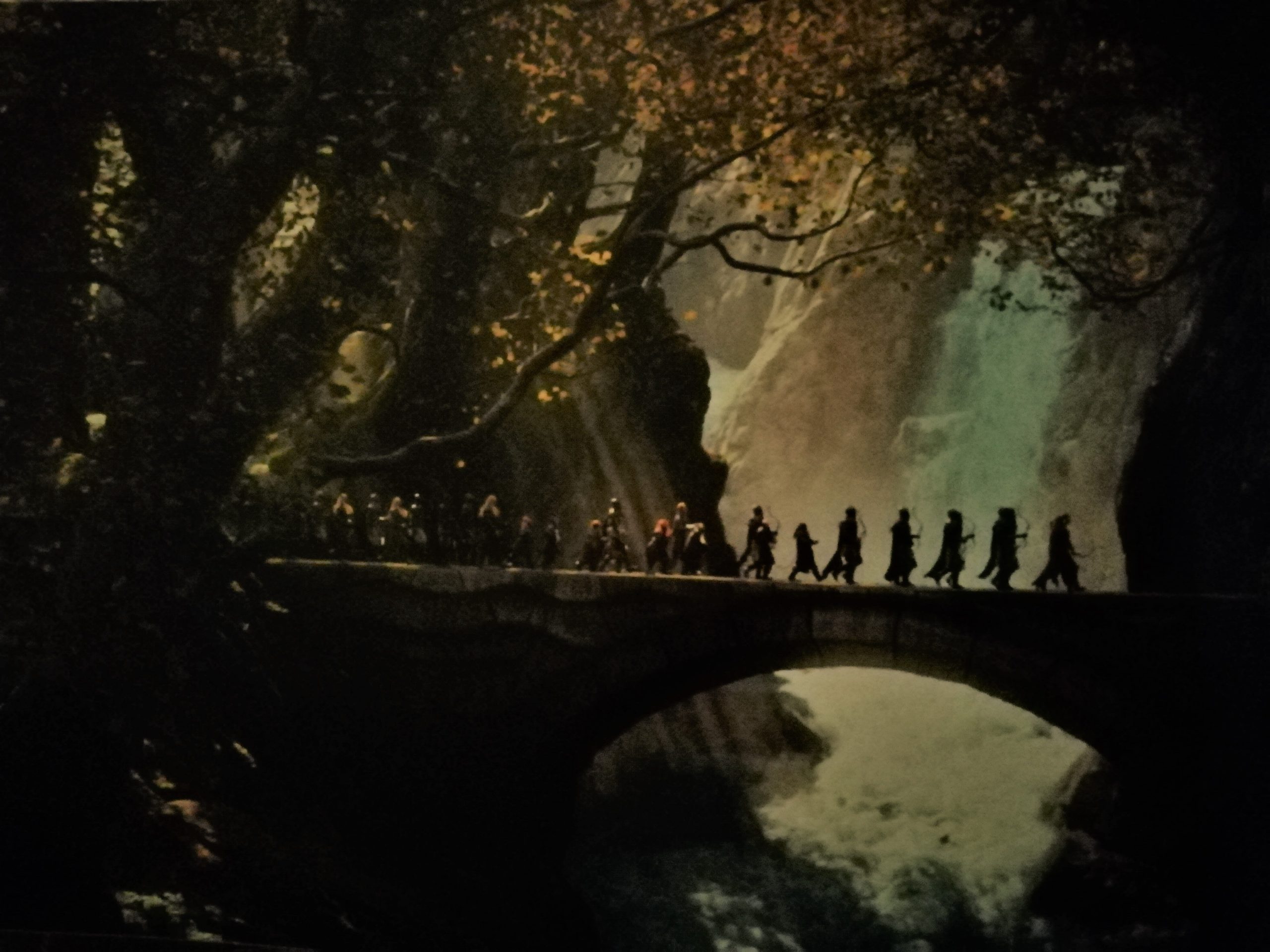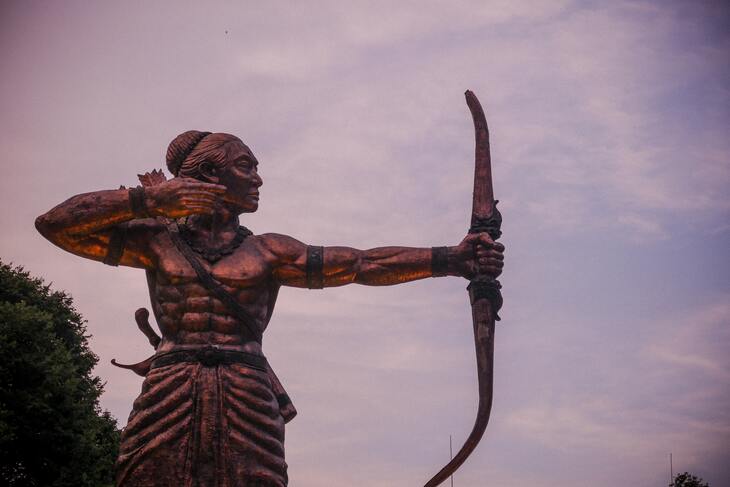With Thorin’s certainty of prevailing the battle that awaits him outside the gates of Erebor and his dismissive attitude toward the bargain struck between the two races, Bard gallops back to Thranduil, awaiting him before the doors of Dale.
Failed attempt at reasoning
Bard: “He will give us nothing.”
Thranduil: “Such a pity. Still you tried.”
Bard: “I do not understand. Why? Why would he risk war?”
Thranduil: “It is fruitless to reason with them. They understand only one thing. We attack at dawn. Are you with us?”
Bard is disappointed and angry at the news he carries to Thranduil. He had counted on Thorin’s sense of fairness as well as him honoring his own promise. However, due to the madness that has befallen him, all of his good characteristics are moot and unrecognizable.
Thranduil, though not saying it explicitly, is grateful to Bard for at least having tried to negotiate with Thorin. I would wager he is much more eager to face the Dwarves in a battle than over a negotiating table anyway, so Thorin’s behavior plays directly into his wheelhouse.
Bard as a sensible, reason driven Man cannot understand Thorin’s behavior toward them. From his point of view there is no victory he can claim over the army of the Elves or the people of Lake-town. So, why would he risk his own death as well as that of his company?
It just doesn’t make sense. And he is right to assume that. For not even Thorin can be a hundred percent certain that his distress call to the Iron Hills Army will bear fruit.
Thranduil is realistic in his predictions. He knew all along that Thorin would not go for peace so he prepares turns to head into Dale to prepare his troop for battle. He is also implicitly counting on Bard’s assistance in it. Though Bard does not answer him, his silence points to an affirmative of the question posed.
Meanwhile, the Dwarves on top of the gates of Erebor are decapitating a statue in order to destroy the bridge to the gate.
A token of friendship
Glóin: “Aye.”
Thorin: “Master Baggins, come here. You’re going to need this. Put it on. This vest is made of silver steel. Mithril, it was called by my forebears. No blade can pierce it.”
Bilbo: “I look absurd. I’m not a warrior, I’m a Hobbit.”
Thorin: “It is a gift. A token of our friendship.”
On either side of what is to become a battlefield, both Men and Dwarves adorn themselves in armor in preparation for the battle ahead. Though the two young princes Kili and Fili are mostly enjoying the experience and looking forward to tasting real battle, those who have once served before the gates of Moria, like Balin, look upon the armor with sigh and displeasure.
It does not bring them a joy to know that this time they would be entering a battle they would surely lose and which their leader instigated on his own without a reasonable argument. It could all have been solved with a conversation, but no, Thorin insisted on war.
The Mithril vest is a kingly gift that Thorin bestows upon Bilbo. He not only looks ridiculous in it but also feels the same way. Bilbo does not see himself in any way as a warrior, which makes this gift a misplaced one. On the other hand, given that war is before them, it would not hurt him to have a defense of his own, given his inexperience in battle. The vest will be his defense against whatever may come his way.
This appears to be another brief moment of clarity for Thorin in which he presents his old self rather than being possessed by his new self.
A sense of betrayal
Thorin: “True friends are hard to come by. I have been blind, but now I begin to see. I am betrayed.”
Bilbo: “Betrayed?”
Thorin: “The Arkenstone. One of them has taken it. One of them is false.”
Bilbo: “Thorin, the quest is fulfilled, you’ve won the Mountain. Is that not enough?”
Thorin: “Betrayed by my own kin.”
And then the mood changes suddenly. He takes Bilbo by his collar to tell him just how he feels about his company. With this gift Thorin isolates Bilbo as the only one of the company he is able to still trust. He has obviously begun to doubt the Dwarves as soon as they couldn’t find the Arkenstone and now, it has reached a new height, that of paranoia.
As Bilbo looks at Thorin a slight resemblance is heard when Thorin utters “false” with an sibilant “s” sound, that of a serpent once heard by Bilbo. In spite of this, Bilbo tries to focus Thorin’s attention to the fact that the quest was a success, they have all survived and Erebor is reclaimed. That was the only wish on Thorin’s mind while they journeyed. However, now it appears to have changed.
Though Bilbo tries, Thorin still harks on the imaginary fact that one of his Dwarves has betrayed him, causing him to doubt them all. Ironically, the one character he did not come to question is the one who has actually betrayed him, or at least that is how Thorin interprets it.
Thorin cannot take the fact that one of his own Dwarves, who he fought with and journeyed with would do that to him. As in any betrayal in any relationship, the betrayed party feels hollow, angry, duped, stupid, but most importantly sad and used. The feeling is akin to being deprived of breath while still breathing, as if the betrayer had squeezed the lungs of the betrayed and let all the air out of it, leaving him gasping.
Resembling Smaug
Bilbo: “Now, you made a promise to the people of Lake-town. Now, is this treasure truly worth more than you honor? Our honor, Thorin. I was also there. I gave my word.”
Thorin: “For that, I am grateful. It was nobly done, but the treasure in this Mountain does not belong to the people of Lake-town. This gold is ours. And ours alone. By my life I will not part with a single coin, not one piece of it.”
Bilbo tries to reason with Thorin, reminding him of not only his promise to the people of Lake-town, but the fact that Bilbo had vouched for his character when no other member of the company would. The word “honor” resonates with Thorin but in a dreamlike way, more than in a way that would deter him from his goal. He doesn’t even perceive it anymore. It does not have an effect on him, not even a defensive one.
As Thorin’s reasoning moves from gratitude he feels toward Bilbo for vouching for him, however hollow that now appears, to acting out on the promise he gave to the people of Lake-town he appears distraught. His head swoons and moves in a serpent-like way without him ever realizing or having control over it.
Now, the “s” sounds coupled with his movement show that what Bilbo was most afraid of – the image of Smaug he had faced not that long ago. Bilbo’s eyes widen as he recognizes the same speech. He is now witnessing the end stage of the transformation of Thorin into Smaug and realizing that he is too far gone.
At the stronghold of Angmar
Tauriel: “Gundabad. What lies beyond?”
Legolas: “An old enemy. The ancient kingdom of Angmar. This fortress was once its stronghold. It is where they kept their great armories. Forged their weapon of war.”
Tauriel: “A light. I saw movement.”
Legolas: “We wait for the cover of night. It is a fell place, Tauriel. In another age, our people waged war on those lands. My mother died there. My father does not speak of it. There is no grave. No memory. Nothing.”
Legolas and Tauriel reach the gateway to the ancient kingdom of Angmar whose once King had been raised from the dead by Sauron. It is only a matter of time before he takes charge of his kingdom again and all evil breaks loose upon Middle-Earth.
The light in the fortress is proof positive that the armory has become operational again and that Legolas’ fears have come true. The Gundabad Orcs are preparing to attack the Lonely Mountain and claim it for themselves, not only for its wealth but for its strategic position.
Legolas’ mother
This is also a part of the story where we find out more about Legolas’ mother. Though we never meet her, the statue of her placed at the Elven gate to Mirkwood paints a picture of what she used to look like. Now, we discover that she had died in Gundabad, presumably defending her son from Orcs. More than that, Legolas tells us the story of his relationship with his father after his mother’s death.
It appears that Thranduil, in order not to deal with his own grief over the loss of his wife, had remained silent about Legolas’ mother since she fell in Gundabad. He has failed to provide his son the feeling of love that his mother had for him, as well as nurturing memory of her. Aside from the statue, there is nothing in the world left of her.
A very sad and insightful way of discovering just how disconnected Thranduil is from his son. However, his eager want of the White Gems fashioned for his late wife, is now understandable, as it is all that is left of her. Obviously, he does not count his own son to that which his wife left behind.
It is obvious that this relationship with his father as well as the silence about his mother is weighing heavily on Legolas. Tauriel’s eyes show compassion and sadness for his misfortunes.
Follow me to my next post.





